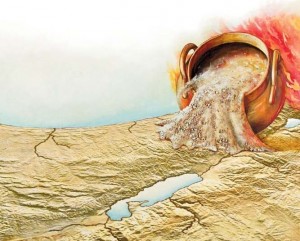After the vision of the almond tree, God again told Jeremiah to tell Him what he saw. In Jeremiah 1:13-14 we get a new image of a boiling pot. He writes, “The word of the LORD came to me a second time, saying, ‘What do you see?’ And I said, ‘I see a boiling pot, facing away  from the north.’ Then the LORD said to me, ‘Out of the north disaster shall be let loose upon all the inhabitants of the land.’” The almond tree emphasized the imminent nature of God’s judgment as well as its inevitability while the boiling pot illustrates both the direction from which the judgment will come and the severity of it.
from the north.’ Then the LORD said to me, ‘Out of the north disaster shall be let loose upon all the inhabitants of the land.’” The almond tree emphasized the imminent nature of God’s judgment as well as its inevitability while the boiling pot illustrates both the direction from which the judgment will come and the severity of it.
It’s interesting to me that the northern enemy of Israel wasn’t Babylon. They were more to the east or the south east. But Jeremiah connects God’s judgment with Babylon and that judgment to come from the north. Weird! Well, although Assyria reigned in the north when Jeremiah proclaimed this prophecy, before the invasion came, Babylon had conquered Assyria and occupied its territories north of Israel. It was from those territories that Babylon’s invasion came! Wiersbe picked this up also, “When Jeremiah began his ministry, Assyria, not Babylon, was the dominant power in the Near East, and no doubt many of the political experts thought Jeremiah foolish to worry about Babylon in the north. But the people of Judah lived to see Assyria defeated and Egypt crippled as Babylon rose to power and Jeremiah’s words came true.”[1]
Do you know who raises up and tears down nations? Yes, of course you do! But God’s people didn’t. They looked to Egypt and Assyria for assistance against Babylon. Instead of turning to the God of all nations for help, they preferred to look to the secular world. How foolish of them! How foolish of us! It’s idolatry in its purest form. Martens observes, “The foremost evil is forsaking the Lord, a complaint Jeremiah will make frequently…This departure from the Lord is the reason, really, for all other evils. The worship of other gods or idols was prohibited in the first two of the Ten Commandments…”[2] During the divided kingdom years both Israel and Judah learned this truth first hand. Jeremiah is often considered to be the Chronicler. In 2 Chronicles 28:20-21 we read, “So Tiglath-pileser king of Assyria came against him and afflicted him instead of strengthening him. For Ahaz took a portion from the house of the LORD and the house of the king and of the princes, and gave tribute to the king of Assyria, but it did not help him.” How soon they forgot! How soon I forget!
[1] Warren W. Wiersbe, Be Decisive, “Be” Commentary Series (Wheaton, IL: Victor Books, 1996), 21.
[2] E. A. Martens, Jeremiah, Believers Church Bible Commentary (Scottdale, PA: Herald Press, 1986), 35.